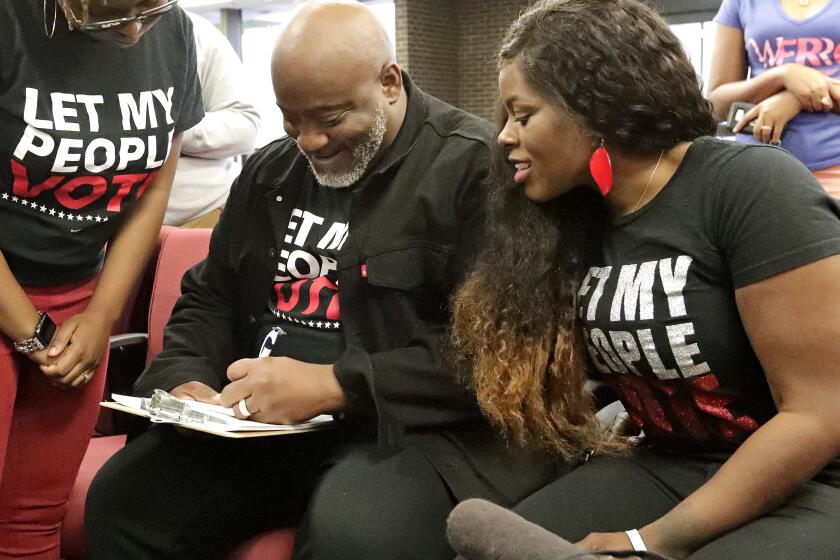Editorial: Surprise: 2016 is about to set a modern record for fewest death sentences
A San Bernardino County judge is expected to follow a jury’s recommendation next week and sentence Gilbert Sanchez to death for the 2001 rape and murder of Sylvia Galindo, a 30-year-old Fontana bakery worker. That sentence will set, incongruously enough, a welcome national milestone. His would be the 30th death sentence imposed in the U.S. in 2016, the lowest annual total since the Supreme Court revived the death penalty more than 40 years ago.
The 2016 ebb point is not just a little bit lower than previous years, but down 39% from the 49 death sentences issued last year, and down 90% from the peak of 315 two decades ago, according to an annual report released today by the Death Penalty Information Center. The reasons for the decline are not crystal clear, but one factor is the general nationwide decrease in homicides, according to Robert Dunham, executive director of the Death Penalty Information Center.
What’s probably more significant, though, is that prosecutors are seeking death sentences less often, which could signal a crucial change in attitudes among those who hold significant power in determining who gets executed and who does not. Juries make that decision in nearly all states (Alabama is an outlier), but not unless they are asked to by the prosecutor filing the case. In fact, the Death Penalty Information Center report found that only 27 counties nationwide sentenced someone to death this year. The leader, unfortunately, was Los Angeles County, where four of the state’s eight death sentences — also the highest in the nation, reflecting the state’s most-populous status — were handed down. Alameda, Kern, Orange, Riverside counties issued one each; Sanchez will be the state’s ninth (and San Bernardino’s only one) this year.
National surveys have found a general decrease in public support for capital punishment in recent years.
And the landscape for capital punishment is changing. As national surveys have found a general decrease in public support for capital punishment in recent years, four high-profile, pro-death-penalty district attorneys in Florida, Texas and Alabama lost recent reelection bids in campaigns that centered on criminal justice reforms, including the death penalty. Executions themselves are also down, though that has less to do with mercy in the criminal justice system than with states having trouble buying lethal-injection drugs — pharmaceutical companies won’t sell their products for use in executions — and with legal holds placed by courts or governors grappling with questions about the constitutionality of execution methods.
The year wasn’t all good news for death penalty abolitionists, however. Despite the broad national trend away from popular support for capital punishment, voters here in California rejected a ballot initiative last month that would have banned it. Instead, they approved a competing initiative that will speed up the appeals process in ways that will likely violate the constitutional rights of the accused, increase the chances of an innocent person being executed and usurp the authority of the state court system. (The state Supreme Court put the measure on hold Tuesday while it considers a legal challenge.) Elsewhere, voters in Nebraska overturned a state law banning the death penalty, and Oklahoma voters preemptively adopted a constitutional amendment recognizing capital punishment.
So where does that leave the fight to end the death penalty? In an odd, but somewhat optimistic, place. Several federal judges have in recent years questioned the constitutionality of the way California and other states conduct the death penalty. And in recent dissents, Supreme Court Justice Steven Breyer has called for his colleagues to reconsider the constitutionality of the death penalty itself. Whether the justices will strike it down once and for all is the big question, especially with the empty Scalia seat still waiting to be filled.
But there is always hope that even a conservative legal mind will recognize that the mood of the country is shifting away from executions. Chief Justice Earl Warren wrote in a 1958 decision that the 8th Amendment’s definition of cruel and unusual punishment “must draw its meaning from the evolving standards of decency that mark the progress of a maturing society.” We hope the court infers from the steady decline in death sentences that American society is maturing, and leaving capital punishment behind.
Follow the Opinion section on Twitter @latimesopinion and Facebook
More to Read
A cure for the common opinion
Get thought-provoking perspectives with our weekly newsletter.
You may occasionally receive promotional content from the Los Angeles Times.






